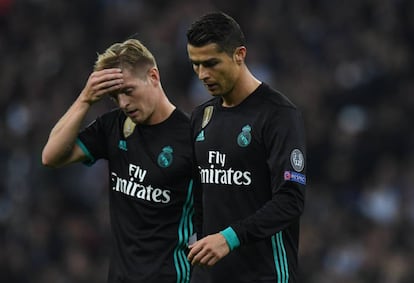What’s gone wrong with Real Madrid?
European soccer champions are a shadow of their former selves and lack of goals is not the only issue
On Monday afternoon, with London’s iconic Wembley Stadium immersed in a religious silence, Real Madrid players gathered in a huddle to listen to their coach Zinedine Zidane. The reigning champion was looking to beat London club Tottenham Hotspur and go top of its group in the Champions League qualifying stage as a way of firmly closing the door on a listless performance against lowly Girona, which the team lost 2-1.

The group of players included veterans such as Sergio Ramos and Luka Modric, not to mention one Cristiano Ronaldo. But another image also came to mind: that of Zidane surrounded by young pups. The average age of the players on the bench was 20.8 years, while 18-year-old Achraf Hakimi was playing on the right of the back four in place of the injured Dani Carvajal.
“The kids have a great future, but Pepe, [Álvaro] Morata and James [Rodríguez] made us stronger. We were missing [Gareth] Bale and [Dani] Carvajal. This squad is not worse than last year, but it is less experienced,” said Ronaldo, who, questioned about his lack of goals lately, told journalists to do a Google search using his name to look for all the goals he’d scored.
This squad is not worse than last year, but it is less experienced Cristiano Ronaldo
But the litter of pups is what Zidane has to work with, given there are no plans for signings in the winter transfer window. The shock 3-1 loss to Tottenham doesn’t mean the European champions are at risk of being knocked out of the competition but it’s clear the team needs to change something.
On Wednesday night, Zidane spoke about Real’s need to find the goal again. “Sometimes you have two chances, you score two goals, but not today – we had chances and we didn't take them,” said the coach and club legend.
But the Madrid team is missing more than just the back of the net; it is also struggling to maintain possession and stay in position: all that on top of the injuries.
The team has lost the capacity to get past defenders and the midfield is leaking possession
What’s left is a slow, fragile Real Madrid, whose defense other teams are having no problem exploiting, whether on the flanks, down the middle or on the counter-attack. The team has let in five goals in the last two games. Since the UEFA Super Cup final against Manchester United in August, Real Madrid has seen its rivals take an average of four more shots than it has managed, while those rivals are also averaging three more chances than the Frenchman’s players are creating. The number of openings rivals have carved out from open play have nearly doubled from 5.6 to 9.5 per game.
Meanwhile, the team has lost the capacity to get past defenders. Isco is the only player trying to do so: an out-of-form Marcelo gave away possession 29 times against Tottenham. Without this penetration, and without the ability to move the ball quickly, Real Madrid is a shadow of the side that reigned in Europe and La Liga last season.
English version by George Mills.
Alarming stats
The midfield core favored by Real Madrid coach Zinedine Zidane of Luka Modric-Casemiro-Toni Kroos gave up the ball 40 times against Girona and 37 times against Tottenham. In the seven previous games this number was below 30.
The team is also seriously missing the tough and versatile Croat Mateo Kovacic, out until January after suffering a partial adductor tear in September. Meanwhile there is a problem on the flanks with Carvajal still out and Marcelo struggling to find touch.
Tu suscripción se está usando en otro dispositivo
¿Quieres añadir otro usuario a tu suscripción?
Si continúas leyendo en este dispositivo, no se podrá leer en el otro.
FlechaTu suscripción se está usando en otro dispositivo y solo puedes acceder a EL PAÍS desde un dispositivo a la vez.
Si quieres compartir tu cuenta, cambia tu suscripción a la modalidad Premium, así podrás añadir otro usuario. Cada uno accederá con su propia cuenta de email, lo que os permitirá personalizar vuestra experiencia en EL PAÍS.
¿Tienes una suscripción de empresa? Accede aquí para contratar más cuentas.
En el caso de no saber quién está usando tu cuenta, te recomendamos cambiar tu contraseña aquí.
Si decides continuar compartiendo tu cuenta, este mensaje se mostrará en tu dispositivo y en el de la otra persona que está usando tu cuenta de forma indefinida, afectando a tu experiencia de lectura. Puedes consultar aquí los términos y condiciones de la suscripción digital.









































